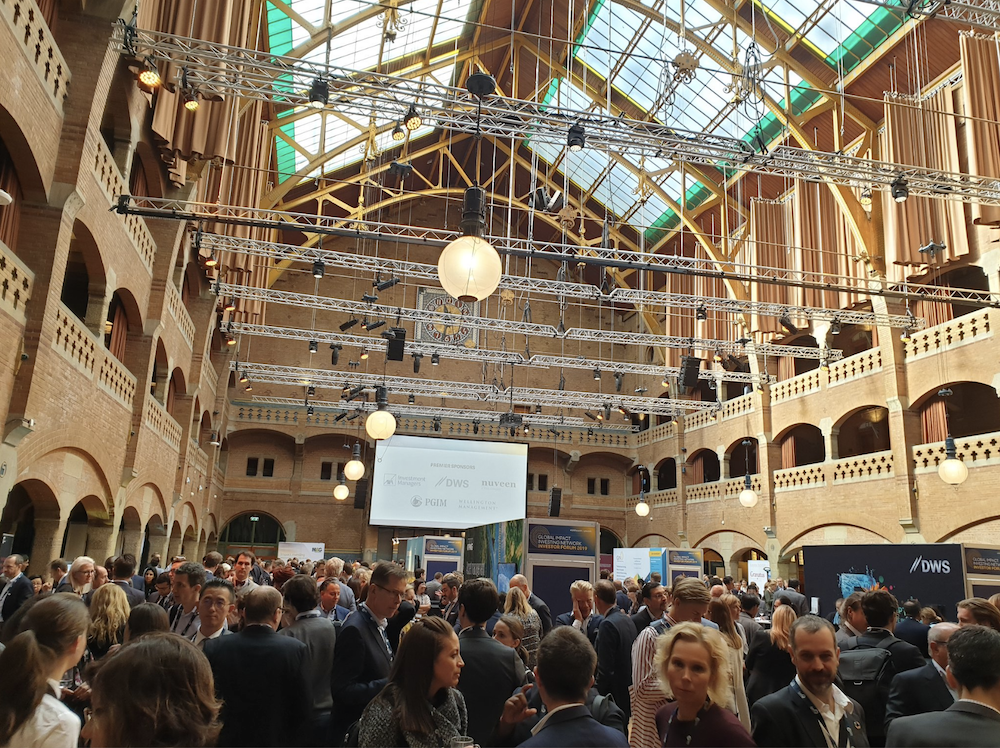Amsterdam, Netherlands – It was drizzly in Amsterdam, but the weather report from this week’s Global Impact investing Network investor forum: It’s getting hot.
More than 1,000 impact investors and other Agents of Impact filled up the vast Beurs Van Berlage, Amsterdam’s old commodity exchange.
“In just 10 years we’ve built an industry,” declared the GIIN’s Amit Bouri. “But we need to move capital at a vastly different scale” to meet the many challenges we face.
Channeling Swedish climate activist Greta Thunberg to challenge the audience, Triodos’ Marilou van Golstein Brouwers added, “The time for empty words is over.”
Sense of urgency
Pressure is mounting on asset managers to get their capital on the right side of climate change and inclusion. “Students are protesting at our door every day,” said Liza Jonson of Swedbank Robur, one of Scandinavia’s largest asset managers. Jonson says Sweden’s insurance companies are also pushing the investor to move forward and faster on sustainability.
Institutional requests for proposals now include ESG and impact reporting that “we have to defend,” said Vijay Advani, CEO of Nuveen. Advani said 100% of Nuveen’s $1 trillion in assets will be aligned with a responsible investment lens by the end of next year.
(A Nuveen spokesperson clarified to ImpactAlpha that the commitment is to align 100% of assets with the UN PRI. Two-thirds of its portfolio, or about $650 billion, is already aligned).
Impact accountability
The real action at the forum was in Grote Zaal, the grand hall of the Beurs Van Berlage.
Dealmakers and fund managers from at least six of the seven continents pitched their books and largely missed the panels that exhorted delegates to simultaneously scale up and protect the integrity of impact investing.
That the gathering presented such a target-rich fundraising environment signals impact investing’s arrival, in a way. But it meant that few of the managers even heard the provocative question from Royston Braganza of Grameen Capital: How many investors have pulled the plug on an investment for failing to reach targets for impact?
The answer: Among hundreds of impact investors in the room, only two had halted investments that failed to deliver on impact.
Transparency watch
The first 60 global investors who signed onto the IFC’s impact principles will disclose by next April how their investment practices stack up to the development finance institution’s nine principles, as well as independent verification of that alignment. KKR Global Impact Fund and LeapFrog Investments already have enlisted the consultancy Tideline to verify their approaches. “It’ll be a real step change in transparency,” IFC’s Neil Gregory told ImpactAlpha.
Mispriced risk
Convergence’s Christopher Clubb says data from the Global Emerging Markets (“GEMs”) risk database demonstrates that the risk of emerging markets business loans are much lower than perceived. The database, which pools data on credit default rates from customers funded by international finance institutions, should be made available to broader investing public, he says.
Faith-based tension
Faith-based investors, including OIP Investment Trust ($550 million), the Church Pension Fund ($14 billion) and Skopos Impact Fund ($200 million) are pushing back on the notion that they are willing to take concessionary returns for their values-aligned investments. It’s more a spectrum, says Candice Dial of Church Pension Fund. The best deals, says Skopos’ Luka Skorochod, are when operational metrics align with impact.
Christian, Jewish and Islamic institutions are energized about the growing investability of their values. Accountability and stewardship are values all faiths share, said Omar Shaikh of the U.K. Islamic Finance Council. Faith-based investors, with hundreds of billions in assets, can add purpose to the dominant narrative of risks and returns, he said.
Filling political voids
In the absence of political leverage, use economic leverage, says Refugee Investment Network’s John Kluge. Kluge called on impact investors to step up their financing of refugee solutions. RIN is building a “refugee investing index” with the Economist Intelligence Unit to help investors select markets to participate in.
Impact in public markets
Don’t be satisfied with current offerings, said Anthos Asset Management’s Dimple Sahni. Sahni, who is developing a public-markets impact strategy for the ultra – ultra – high-net-worth Brenninkmeijer family, dropped this hint: “I wouldn’t mind anchoring a public markets fund mapped to the SDGs.”











